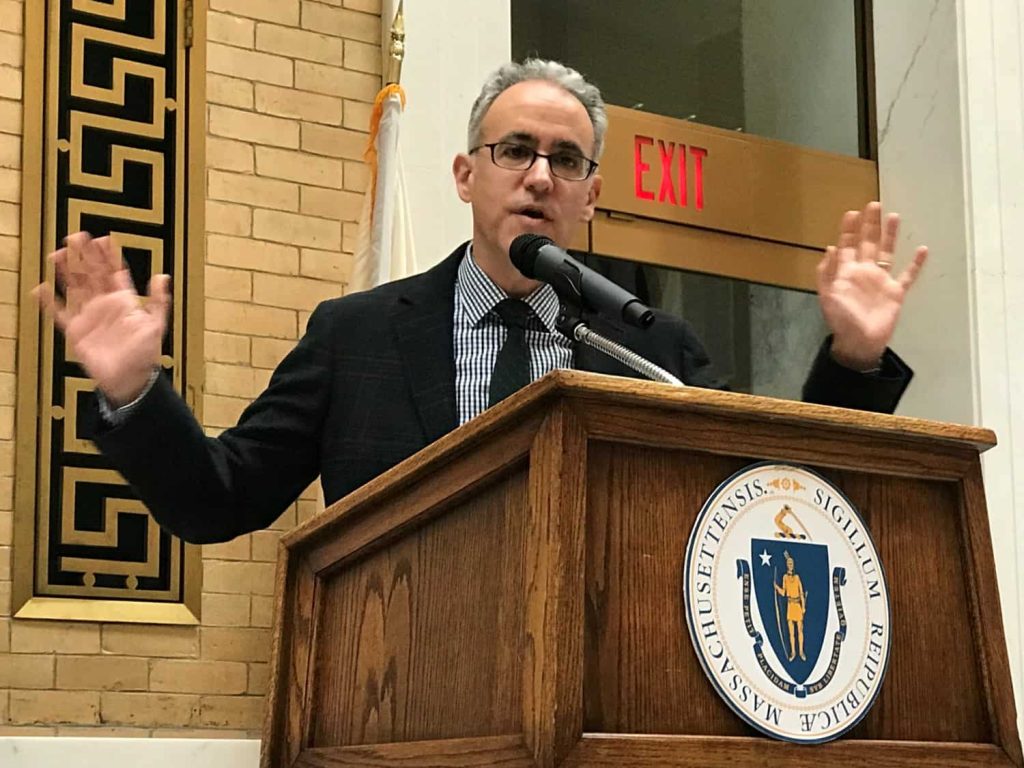128 Technologies CEO Andy Ory shared seven observations and three humble requests during an outstanding keynote address at the TechHUB Caucus State House Innovation Day on Monday, January 29th. We invite you to watch or read his inspirational talk below.
Andy’s prepared remarks follow:
Who here is old enough to have voted for Mike Dukakis in the Presidential election of 1988?
Really? OK, good crowd.
I ask because 1988 is a special year for me. It’s the year my adventure as a member of the Massachusetts innovation ecosystem really began. But when I stand here at the state house and think 1988 I still think about that image of the Duke riding in the tank wearing that helmet. Thank you MassTLC for not asking me to get into a tank today…
That was the year I graduated from school across the river, no not MIT. And after a few months riding around in a 1971 VW camper bus following the Grateful Dead and visiting great examples of American architecture, that’s the subject of a very different talk, I ended up back across the river in Kendall Square at a startup company called Boston Technology.;
Kendall Square was pretty sketchy in those days. My car was stolen off the street twice in one year…Boston Technology on the other hand was exciting and innovative. The two founders who I thought were very old at the time, they both were 30, had taken advantage of the AT&T breakup to create the world’s largest voicemail systems. These were the first systems big enough for the Baby Bell’s to use to offer residential voicemail…Four years in college didn’t teach me nearly as much about business as a year and half at a high tech startup…
Having learned a lot, I left there in 1991 to start my own company, with an investment from my parents (Hi Dad.) That company was called Priority Call Management.
Priority Call Management was able to use some of the underlying technology that Boston Technology’s suppliers had developed to enable phone companies to offer more exciting services than just voicemail; things like calling cards, prepaid cards, single number services, etc… It was a good business, not great, but the late 90’s WERE great! In business, like life, you make many decisions and they are not all created equal. In my case, deciding to sell Priority Call Management in 1999 was a really good very impactful decision.
Thanks to the evolutionary miracle of selective memory that enables humans to have more than one child, or be serial entrepreneurs, I decided to start Acme Packet in 2000. Timing does work both ways. Remember the early 2000’s? These were dark times in tech. Most of my customer visits were to newly empty buildings with floors and floors of empty cubes…One of my VC’s even took our business off their website saying that it hurt their profile to simply show that they had invested in us! But we saw a fantastic opportunity. Networks were changing to accommodate the Internet model for voice and video communications. And we were certain this was not going away anytime soon. It turned out we were right, Acme Packet became a success, going public in 2006, and eventually being acquired by Oracle in 2013. Acme Packet was an unusual public company in many ways but two I am really proud of. First, for most of our 13 years we did ALL our engineering development, test, support, and manufacturing in Massachusetts. Second, the founding management team was the same group that also brought the company public and ran it for several years!
After discovering that I was a lot like my dad who is 85 and still comes to work, I decided it really is a blessing to have a job. So, we pretty much put the band back together in 2014 to chase an opportunity that is even bigger than the one we’d spotted back in 2000… to fix the Internet we had helped enable, to rethink the router model that had pretty much been developed back when disco was king, and replace it with one that spoke the same language as the services and applications that networks are responsible for delivering today.
I’ll spare you the gory details, but the topline of what we do is this: 128 TECHNOLOGY MAKES YOUR NETWORK DO WHAT YOUR BUSINESS NEEDS. We’re an enterprise software company that makes the routers in your network “Session Smart,” meaning they can understand what applications and services they’re being called on to support. And they can make sure your network has the right resources to deliver these services and applications faster, better, cheaper, and more securely than anything on the market today.
Alright…For those keeping track, that’s 30 years’ experience building technology companies right here in Massachusetts, complete with all the daily failures and quarterly triumphs that building any business entails. After some reflection on those experiences for today’s talk, I’ve gathered together 7 observations of what it was like, and I’d like to share them with you today. After that I’d also like to make three humble requests for the esteemed group of public and private servants gathered here today, and to get your feedback when all’s said and done.
OK? Ready?
My first observation is that MASSACHUSETTS WORKS. It really does. It works not only in the companies it creates, but in the public private partnerships between business and state government that we are evidence of right now. In my 30 years the government hasn’t shut down, delivers critical services, invests in public education, and is actually interested in how it can help foster an environment conducive to business success.
My 2nd observation is that for all our many gifts of nature and civilization, our greatest is perhaps the steady stream of world class engineering talent produced by our fantastic colleges and universities. From Amherst to Worcester Polytech – through BC, BU, Harvard, MIT, Northeastern, Tufts and all the rest – the concentration of top tier educational institutions here is so remarkable, I feel we sometimes take it for granted. And those schools produce such incredible talent in part because they attract such incredible talent… from every corner of the globe, to have the quintessential collegiate experience that Massachusetts has delivered on longer and better than anyplace else on Earth.
Now, let me be clear. It’s not all unicorns and rainbows here, and my 3rd observation is an obvious one – just wait for tonight’s snowy commute… which is that for all the warmth of our islands in the Summer, the glories of our Autumns, the magic of our Springtimes… the weather here kind of sucks for a stretch that sometimes starts around Thanksgiving and ends around Easter.
Now I know many in the room will disagree with this, and what’s not to love about a clear blue sky over a New England ski slope during the Presidents Day holiday we’re about to enjoy? But I think the data does point to a preference on the part of most people for warmer and more temperate climes than our great Commonwealth is able to deliver for a good long stretch of the annual calendar.
Even this, though, is not without it’s blessings…
My 4th observation is that – in places where snow doesn’t ever fly sideways the competition for the engineering talent which is the lifeblood of tech startups is nothing short of brutal.
Folks ready to start a career in the valley have no shortage of great companies to compete for their talents. Google, Facebook, Apple, Uber, PayPal, Dropbox, and on and on are locked in a death struggle for engineering talent. And if you’re a company no one’s ever heard of, its going to be very difficult to compete.
Which brings me to my 5th observation, about a nuanced difference in the ways new companies are built on the East Coast as compared to the West.
The archetypal West Coast company is started by a smart young person who graduated from a top university, then did a stint at one of the big companies I just mentioned, becoming intimately familiar with a scaled customer problem that their company was failing to address. They leave to build a product that can fix it, raising capital from the contacts readily available on Sand Hill Road and the race is on.
On the East Coast – though there are certainly notable exceptions – the flow is often different. Here it’s more common for a graduate student at one of our best schools to develop some revolutionary science or capability, then to strike off directly in search of a business in the form of a real world problem their new technology might solve. Rather than the flow from problem to solution more prevalent on the West Coast, East Coast entrepreneurs seem more often to work from Solution to Problem.
Now, neither of these approaches is better than the other in every case. But I do think the West Coast is somewhat more effective at the process of market selection that so often limits the scale of an enterprise technology startup, with the effect that they end up with a larger number of large, anchor companies out there.
Think about it…Here we tend to build companies around technologies. There they tend to build companies around markets. For example, computing did not go away but Digital, Wang, Prime, Apollo, Data General did. The market for computing grew exponentially but the technologies delivering computing changed drasticly driving those Massachusetts businesses to extinction. Today, everyone of you has more computing capability in your pockets and purses than any of those now defunct companies’ products ever delivered!
6th is a clear advantage for Massachusetts.
To illustrate my point I’m going to attempt a magic trick, without the benefit of smoke and mirrors. I want everyone to participate. OK?… Everyone close your eyes and think of a famous person from the Silicon Valley area of California. Get this persone in your head, paint a clear picture in your mind. OK? Are you there? Great.
<<Looking at a few folks directly say..>>
OK… [puts two fingers to temple in mock mindreading mode] I’m getting something… OK. Is the person your thinking of a white male who made a lot of money building a massive technology company?
TA-DA! Thank You, Thank You All.
Now if I ask you all to think of a famous person from Massachusetts, let’s say inside the 495 belt, which is about the same size as the Valley.
While some white male entrepreneurs surely do come to mind, I’ll bet that for many in the room a former U.S. President did, or a prominent female Senator, or an elequent African American Academic, an Indian Scientist, or these days maybe even a certain NFL quarterback.
My point, of course, is that the diversity of not only ethnicities and genders but also spheres of influence and intellectual life are vastly more broad in the Greater Boston area than they are in the Valley. From politics, to science and medicine, to art, academia and literature, to sports and entertainment, and on and on… There’s more to life here than just building companies, and I actually think that’s a huge strength of our region, and something I’m quite proud of.
My 7th and final observation is about the nature of innovation we produce.
If there’s a quintessential West Coast technical achievement, for me it has to be the SpaceX rocket launch. It’s big, it’s flashy, it’s noisy… everybody talks about it and ooohs and aaahs – and rightly so – as this truly is an audacious achievement for a private company.
When I think of the quintessential East Coast innovation, I always think of the Space Suit, much of which was developed by David Clark and Company in Worcesterl. We actually have a conference room called Space Suit at our headquarters in Burlington. That’s because the space suit is, I would argue, a somewhat more practical if less flamboyant statement about our place in the night sky. We’ve all seen images of a lone pilot floating high above the curved blue horizon of the Earth. We’ve all been inspired by the symbolic meaning of humanity’s ability to float among the stars. It’s a quieter innovation, certainly, than a rocket that can land like a lawn dart on a floating barge. But that’s ok with me. Because a space suit is about being someplace incredible, and not just about getting there.
Now… with all that said, you need both a rocket, and a space suit to float above the Earth. It’s not always a competition with Silicon Valley, but a partnership that can advance all of us forward.
I have always believed the real competition is with yourself. So, given that, I thought… What could we do right here in Massachusetts to accelerate innovation?
My first ask of the Commonwealth is a simple one: BE A CUSTOMER.
Embrace the state’s role as an early adopter of enterprise technology for MA-based startup companies.
Think about this… If Massachusetts were a business, it would sit between Morgan Stanley and Merck in the Fortune 100. Our local tech companies would kill for a customer like that, but it sometimes seems the Commonwealth has little interest being an early adopter and enabler of these companies. Our state government should go out of its way to BE AN EARLY CUSTOMER to tech startups in the Commonwealth, because when they win, we all do.
My second humble request is this: HELP TRAIN THE TALENT.
Focus state resources on the training of young managerial talent in our growing start-up companies. Our great universities supply the technical resources we need. Many of them will be promoted, despite too little experience, or training as managers. We do all we can to support these folks, of course, but if the state could provide dollars for start-up companies to provide managerial training, this would go a long way towards helping these companies succeed.
My third and final ask makes sense once you think about it: COMPETE WITH CALIFORNIA AND OTHER HIGH TAX STATES
To be more specific, I ask that you consider supporting a measure to provide favorable state tax treatment for key people looking to relocate to New England.
A life spent on technical innovation is a portfolio of adventures and experiences, each usually lasting 5-10 years. I know many people who’d be very happy to spend one of those adventures on a life experience right here in New England, and we should do more to encourage them to do it. I predict that if they come they will love it and they will not leave.
As I’ve said many times today, the competition with Silicon Valley is really a competition for talent, with us having the advantage of our colleges and universities, and the disadvantage of our weather. Competition for senior management talent is especially intense and frequent. Targeted, creative state tax treatment would be a boon to growth that would benefit all.
So… to wrap up here, a few closing points:
- After 30 years here, we’re building 128 Technology in MA because it’s the best place to build a world-class technology company.
- Our state’s advantages – from great management, to universities, to a culture of technical innovation and pragmatism – offer us a huge asset.
- Even our weather helps, through the lens of engineering labor demand.
- The state can do more, starting with a genuine effort to be the big customer young technology companies need to shape their offering.
- Help us develop our most promising young leaders’ management skills.
- Consider tax incentives to attract the West Coast’s best management talent, just as they draw on our the best graduates.
Thank you for your time and attention today, and thank you for working together with us to make Massachusetts the best place to build technology companies that really will change the world.


